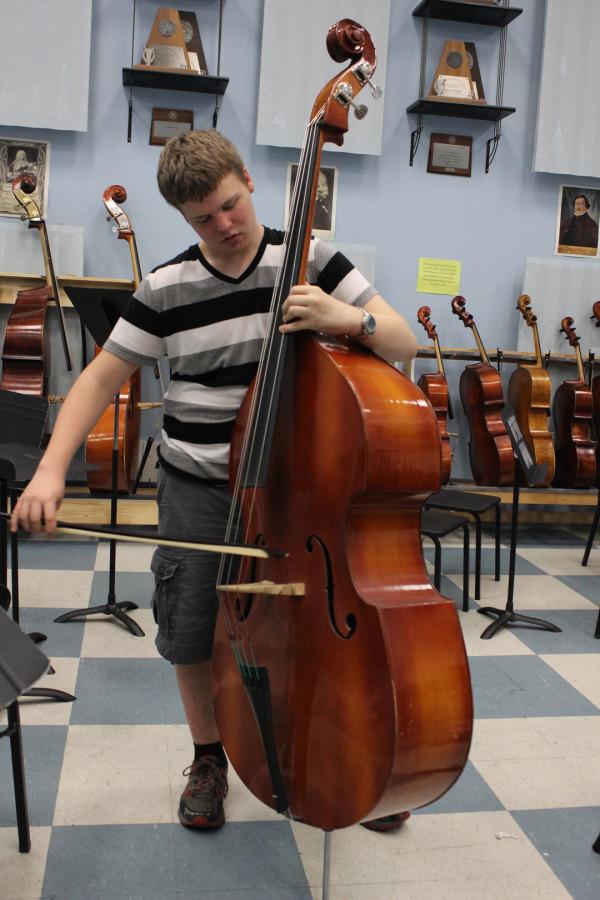Orchestra finishes season with exemplary in UIL
Seven strings, four violins, three violas, two cellos, and a number of wind and brass players assembled into the pit. Orchestra received the first ‘best orchestra’ award ever given by the Greater Austin High School Musical Theatre Awards (GAHSMTA).
In addition to the GAHSMTA award, the UIL season also brought recognition and achievement to the orchestra company.
“Every year in the spring we have a couple UIL contests, one is the solo contest where students go and play for a judge, that takes place in January. Later on in the spring we have four orchestra contests, end of February to the beginning of March, then we also have the string orchestra contest.” orchestra director Dr. Giovanna L. Cruz Pifano said.
Many organizations, like theatre and forensics, have five levels to the UIL competition. Starting with Zone, then District, Area, Regionals, and ending in State. For orchestra, all competition is thrown into one day.
“For orchestra there is actually just the region contest, which was held at Westlake for the full orchestra while the string orchestra was at McCallum,” Pifano said. “The contest lasts all day, but the portion that we participated in took 40 minutes for concert and half an hour for sight-reading.”
Orchestra students are flung into an event called sight-reading in which they play a piece of music without any prior knowledge of it.
“Sight-reading is where you go into a room and you see the music for the very first time, you’ve never heard it before, you’ve never played it before. I have them ‘shadow play’ to the music, where they pretend to play but they can’t make any noise. It’s very stressful,” Pifano said.
During the UIL season the company works hard to prepare for the intense competition.
“We have rehearsal during class every day, but during the UIL contest, starting in January until the contest was over, we did two extra hours a week after school,” Pifano said.
When the performance comes, even though it can be stressful, it’s the best part according to sophomore Miranda Salazar.
“Oh, I love performing,” Salazar said. “when you rehearse you’ve heard it a hundred times, but when you get to perform it and the audience has never heard it before it’s amazing.”
Although, hours can be long and competition tough, the achievement makes all the difference. The company finished the season with an exemplary award in concert and superior in sight-reading. UIL orchestra ratings go from one to five, one being superior, two excellent, three average, four below average, and five is poor.
“There’s a lot of time invested and early mornings, but when we get that exemplary rating then it’s all worth it,” Salazar said. “I got a one, which is the highest you can get for my quartet.”
The orchestra program ended the UIL season and had a campus showcase on Tuesday, May 13.
“We played a really intense class five piece, but we handled it pretty well and we even played a piece composed by one of our bassists, Evan Spake,” Salazar said.
Many orchestra and band members are introduced at a young age, according to Salazar.
“I’ve been playing the violin for five going on six years. I got started because my piano teacher when I was in fifth grade was also teaching violin,” Salazar said.” I gravitated towards it and just loved it, the next week I bought my own and started practicing.”
Students involved in orchestra or band may borrow from the school for certain instruments, but many buy their own.
“My violin was probably $250, however over the course of owning two violins I’ve gone through four bows and I go through lots of strings,” Salazar said. “But people dance because they like to dance, or act because they like to act. I just love playing.”
While orchestra students prepare for their upcoming placement exams, the directors begin working on next year’s season and thinking about the new kids who will soon become apart of the company.
“The whole program has 125 students and there are certainly talented kids, but hard work is the most important thing, talent only gets you so far,” Pifano said. “You could have all the talent in the world but if you don’t use it, it goes to waste.”
Your donation will support the student journalists of James Bowie High School. Your contribution will help cover our annual website hosting costs. Any contributions made through this service are NOT tax deductible. If you would like to make a tax deductible donation OR to subscribe to our print edition, please contact us at [email protected].







